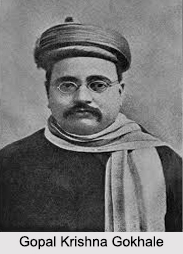 Gopal Krishna Gokhale was one of the founding social and political leaders during the Indian Independence Movement against the British Empire in India. Gokhale was a senior leader of the Indian National Congress and the Servants of India Society. The latter was committed to only social reform, whereas the Congress Party in Gokhale"s time was the main vehicle for Indian political representation. Gopal Krishna Gokhale was a follower of Mahadev Govinda Ranade. He was popularly known as the "Socrates of Maharashtra".
Gopal Krishna Gokhale was one of the founding social and political leaders during the Indian Independence Movement against the British Empire in India. Gokhale was a senior leader of the Indian National Congress and the Servants of India Society. The latter was committed to only social reform, whereas the Congress Party in Gokhale"s time was the main vehicle for Indian political representation. Gopal Krishna Gokhale was a follower of Mahadev Govinda Ranade. He was popularly known as the "Socrates of Maharashtra".
Early Life of Gopal Krishna Gokhale
Gopal Krishna Gokhale was born on 9th May 1866 in a Maratha Brahmin family at the princely state of Kolhapur. After graduation in the year 1884 Gokhale joined the Deccan Educational Society founded by Mahadev Govind Ranade. He served the society for 20 years in various capacities as a schoolmaster, a professor and Principal of Fergusson College, Pune. He also edited the quarterly journal of the "Poona Sarvojanik Sabha".
Political Career of Gopal Krishna Gokhale
Gopal Krishna Gokhale made his first appearance in the political scenario of India, when he came to the platform of the Indian National Congress at the Allahabad session in the year 1899. In 1902 he was elected to the Bombay Legislative Council. Later he was also elected as the member of the Imperial Legislative Council. Gokhale worked as the Joint Secretary of the Indian National Congress. Later in the year 1905 he also presided over the Benaras session of the Indian National Congress.
Contributions of Gopal Krishna Gokhale
In the Council, Gokhale made his mark as an eloquent and a great speaker. He vehemently criticized the Indian official finance and also spoke of the annual budgets. He also condemned the Salt Tax imposed by the government. Gokhale exposed the hollowness of the British pretensions in the matters of appointment of the Indians to the higher services.
In 1905 Gokhale laid the foundation of the Servants of India Society with a solemn view to the training of the national missionaries for the service of India. The aim of the Servants society was also to promote true interest of the Indians by the constitutional means. In 1906 he went to England with the solemn aim to make the Europeans aware of the situation created in owing to the Partition of Bengal 1905. He also played a great part officially and unofficially in the formulation of the Morley Minto Reforms Act of 1909. In 1910, Gokhale was again elected to the Imperial Legislative Council. He also served as the member of the Indian Public Service Commission. He urged the government to increase the share of the Indians in the higher Services. During 1910-1913 Gokhale made heroic efforts in the Imperial Legislative Council for the introduction of the free and compulsory education throughout India. As a political man Gokhale was a true liberalist. He was a staunch believer in the moderation and rational transformation.
Though Gokhale did not explicitly support Indian independence by radical means yet he influenced the trend and strategy of the Indian struggle for Independence. Gopal Krishna Gokhale became unpopular with both the government and in the Congress. To the extremist leaders, Gokhale became a faint hearted moderate and the British government considered him as the seditionist in disguise.




















